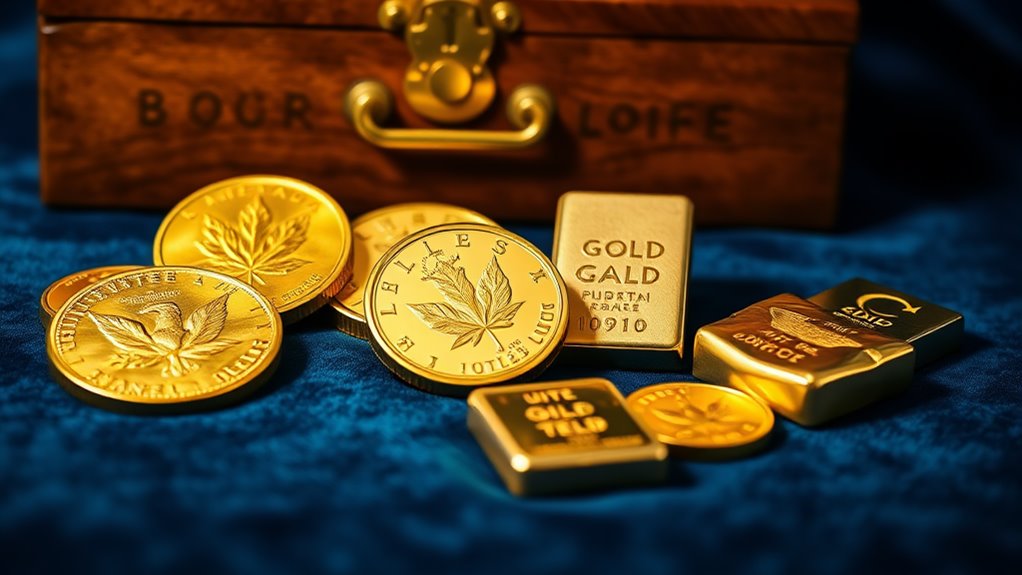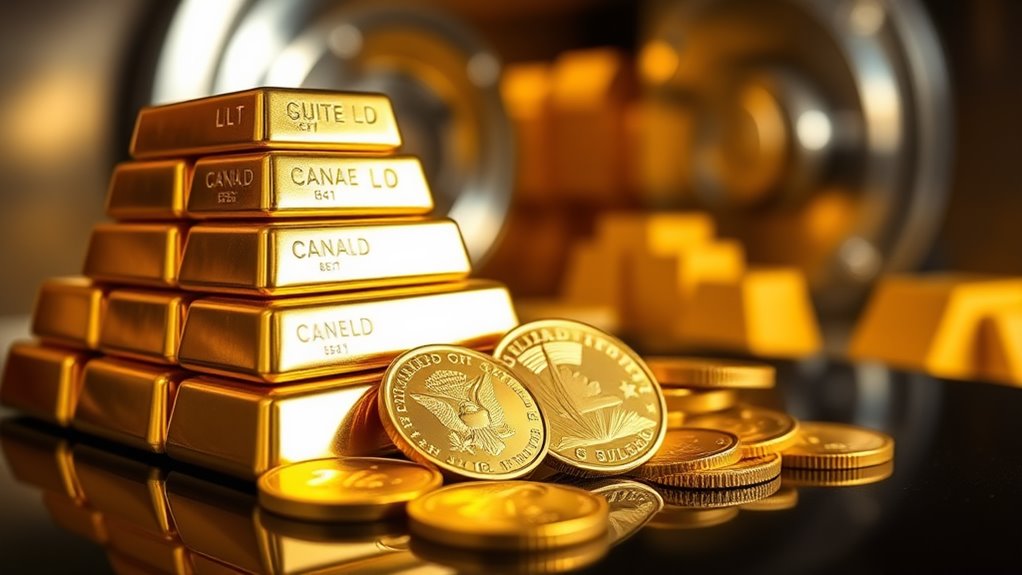Investing in Physical Gold
Note: This post may contain affiliate links, and we may earn a commission (with No additional cost for you) if you make a purchase via our link. See our disclosure for more info. The crypto world is constantly changing. This content is for informational purposes only and not financial, legal, or professional advice So, please verify the info on the cryptocurrency provider’s websites.
Investing in physical gold? Smart move. Gold is tangible. You own it. No bank nonsense involved. It's a safe bet when the economy looks shaky. Prices have soared—over 40% recently. Gold doesn't degrade, and it's a classic store of value. But it's not all roses. You need to securely stash it and truly understand the market. Taxes and ownership details might surprise you. Curious about the kinds of gold that suit your style? Keep reading.

When it comes to investing, many people think stocks and bonds are the only game in town. They're wrong. There's a shiny alternative: physical gold. Yes, gold. The stuff that's been coveted for centuries. But what does investing in gold really mean? Let's break it down.
First off, gold comes in various forms. Bullion bars are the heavyweights here—literally. Standard weights like 1-ounce or 10-ounce bars pack a punch with their high value-to-weight ratio. Then there are coins, like the American Gold Eagle or Canadian Maple Leaf. These aren't just shiny discs; they're government-minted pieces of art that carry recognition and craftsmanship.
Gold comes in many forms, from hefty bullion bars to exquisite coins, each offering unique value and artistry.
And if you want a bit of flair, consider semi-numismatic coins. They offer a blend of liquidity and privacy, with premiums that depend on their rarity and condition. But for the true collectors, numismatic coins are where it's at. These beauties have value tied to their rarity and age, often dancing to a tune that has little to do with the current gold spot prices.
Now, let's talk advantages. Gold is a tangible asset. You own it. No one can swipe it from your account with a keystroke. It's also an inflation hedge. When the economy goes haywire, gold tends to keep its value. Plus, there's no counterparty risk. You're not relying on a bank to hold your worth. Physical gold investments are classified as collectibles, which can result in higher capital gains taxes. Additionally, gold acts as a hedge against economic downturns with an inverse relationship to the market.
And let's face it, gold is durable. It won't disappear into the digital ether or crumble to dust. It has a safe-haven status, acting like a bouncer at the club of investments when the market gets rowdy. Recent market trends show gold prices have surged over 40% since early 2024, demonstrating its continued appeal during uncertain times.
But hold on! Before you rush to your nearest dealer, think about storage. Gold needs a safe home. After all, it's not just a shiny paperweight. It's an investment. So, when considering the world of physical gold, it's wise to do your homework. It's more than just glitzy bars and coins; it's about security, value, and a bit of history wrapped up in gold.
Frequently Asked Questions
How Do I Store Physical Gold Safely at Home?
Storing gold at home? It's like playing hide-and-seek with thieves.
First off, get a fireproof, waterproof safe, and bolt it down.
Don't flaunt your treasures in plain sight. Use biometric locks—keys are for amateurs.
Create decoy spots; fake containers are your friends.
Keep detailed records for insurance—trust me, you'll need them.
And remember, if a natural disaster strikes, your shiny stash might not stand a chance.
Stay smart, stay safe!
What Are the Tax Implications of Selling Physical Gold?
Selling physical gold? Get ready for some tax fun.
The IRS treats it as a collectible. That means a long-term gain gets taxed at a hefty 28%. Short-term? Ouch—ordinary income rates bite.
You'll need to report gains on Schedule D and Form 8949. Hit those thresholds? Grab a Form 1099-B.
And if you inherited it? Lucky you—enjoy that stepped-up basis.
Just don't forget the paperwork. Taxes are always lurking!
Can I Invest in Gold Jewelry Instead of Bullion?
Investing in gold jewelry? Sure, if you enjoy paying extra for shiny things.
Jewelry's all about looks, not pure gold content. You'll likely lose money when reselling, thanks to those pesky premiums and subjective appraisals.
Good luck finding a buyer who cares about your unique piece's "value." Unlike bullion, which is straightforward and liquid, jewelry can become a stylish paperweight.
How Do I Authenticate Physical Gold Before Purchasing?
Authenticating physical gold? It's a bit of a treasure hunt, really.
First, eyeball that shiny piece—sharp edges and correct stamps are essential. A magnet? Not your friend here; gold doesn't stick.
For fun, drop it in water—if it sinks, you might be onto something.
Want to go hardcore? Nitric acid won't lie.
But hey, if you're feeling fancy, X-ray tests can be your best buddy. Just don't expect it to be foolproof!
What Are the Common Scams Associated With Gold Investments?
Common scams in gold investments? Oh, they're everywhere.
Think "unrealistic returns"—like, who believes that?
Then there's the "limited-time offer" nonsense, designed to make you sweat.
Don't even get started on counterfeit gold. Brass masquerading as the real deal? Classic.
And those Ponzi schemes? Yikes. They'll take your cash faster than you can say "gold standard."
Just remember: if it seems too good to be true, it probably is.










